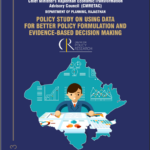
Chhattisgarh Survey- Observations from the field
24 August 2015
Accountability Initiative (AI) has finished the field work for Chhattisgarh PAISA survey. Nearly two months of field based activities, preceded by months of preparatory work is complete now. Actual roll out of the survey happened in the first week of July and continued for a month, Chhattisgarh PAISA study is a joint initiative of Chhattisgarh Government, UNICEF and Accountability Initiative. We want to know how much of the money that is allocated by the Indian Government and State government for some of its flagship social sector schemes reaches the last mile beneficiaries, and whether the money reaches the beneficiaries on time. Programmes for which the survey was undertaken include Sarva Shiksha Abhiyan(SSA), Rashtriya Madhyamik Shiksha Abhiyan(RMSA) , Mid-Day Meal(MDM) and the supplementary nutrition (hot cooked meals) component of the Integrated Child Development Scheme(ICDS). The data collection involved having face-to-face interviews with some of the key stakeholders like the headmasters, anganwadi workers, ration shop dealers, people who matter most in the micro level implementation of these schemes.
Data was collected for two months during the field survey from over 240 villages in four districts of Chhattisgarh through engagement of more than 250 citizen volunteers. Accountability Initiative’s researchers and PAISA associates spent days after days in the districts and capital of Chhattisgarh in the last 9/10 months. They spent the days talking to government officials for understanding the social sector schemes in the state, liaising with civil society organisations for engaging citizen volunteers and testing the tool kits that was used in the course of the survey. Some of the districts, as we have been told by the locals, are really ‘risky’ to work on the ground. But thankfully AI staff members did not encounter any kind of untoward incident in these so called ‘risky’ districts. On the contrary the local people were extremely hospitable and helpful in their behavior. Remoteness of some of the blocks spread across all the four districts where the survey was conducted namely Rajnandgaon, Jhanghgir Champa, Surajpur and Bastar as well as hazards due to heavy rainfall although created some momentary bottlenecks but were not strong enough to dampen the enviable zeal and commitment of AI team members and citizen volunteers.
60 villages from each of the four districts were selected in a way that these village are spread across blocks with and without significant proportion of tribal population. Citizen volunteers were selected from these districts and were trained on the survey tools and data collection technique in a week long training programme, imparting both theoretical knowledge and hands on survey experience from the field through pilot testing of the tools. Cohort of the citizen volunteers involved an interesting mix of people. Some of them were seasoned social workers having been involved in many surveys before and a significant number of the volunteers were college and university students. Thorough networking with district and block level government officials were undertaken, thanks to the help extended by the State Government and UNICEF team at Raipur.
Data analysis is planned over the next months and report would be ready by the middle of next year. Although data will tell the story of the actual realities on the ground, AI staff members gathered immensely valuable experience about the ways the government sponsored schemes actually work and get implemented in the field.
School management meeting was going on and I observed that some of the parent members of the committee from tribal communities were extremely diffident and shaky in entering the meeting room. Immense joy was noticed on the children’s faces at the ringing of the bell announcing the mid day meal. Two of the ICDS workers in a village could not resist complaining, about the paltry sum of money being given to them as fuel cost. In one of the villages, schools and ICDS centres were wrapping up quickly for the day to take part in the post funerary rights of the ex gram panchayat head as a mark of respect. These are some of the observations which did strike me on the field, which I think have different connotations worthy of exploring further.
Nuances are many, interpretations could be manifold but what does matter is to urgently iron out some of the very basic problems of these schemes as the precious time of the children’s lives, like tide, will wait for none and certainly not for the innumerable bureaucratic rules and paraphernalia.





